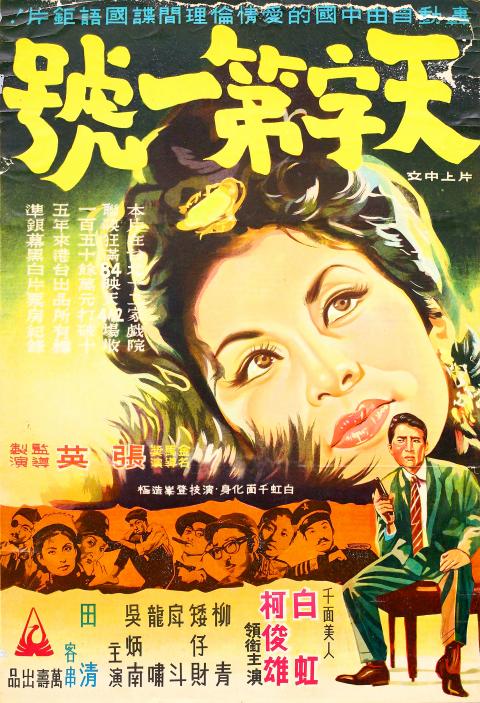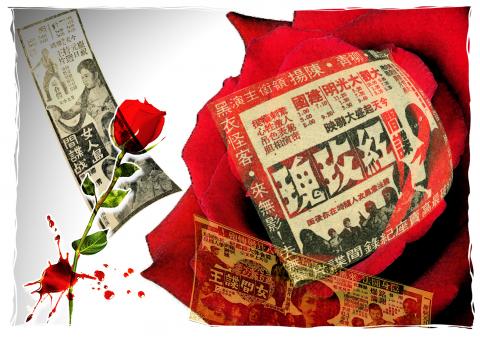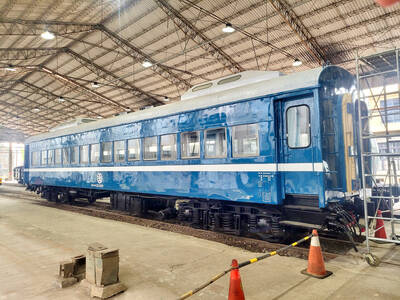The two existing film copies of The Best Secret Agent (天字第一號) were both in terrible condition. One was overexposed with significant damage in the highlight areas, while the other showed severe deterioration with scratches, stains, mold and flaky coating.
However, it was fortunate that the 1964 Hoklo-language (also known as Taiwanese) femme fatale flick was preserved at all. After the decline of the Hoklo film industry in the late 1970s, many directors sold their reels to scrap dealers, while the film strips ended up as linings for shirt collars, straw hats and wooden sandals. Countless more were lost to floods, fires and the ravages of time. When people started paying attention to these movies again in the 1990s, many had already been permanently lost.
Lee Cheng-liang (李政亮), assistant professor at National Chengchi University’s College of Communication, estimates that out of the more than 1,000 Hoklo films produced between 1956 and 1981, only about 200 remain.

Photo courtesy of Taiwan Film Institute
The Taiwan Film Institute (國家電影中心) has taken on the role of preserving, restoring and digitizing these films since 2013. What remains is still quite diverse in genre and style — many taken straight from Hollywood, resulting in curious and campy Taiwanese Westerns and spy movies often featuring female leads.
The restored version of The Best Secret Agent was screened at Enka Library (櫞?文庫) last weekend as part of a Taiwan Film Institute program to encourage coffee shops and other establishments to screen Taiwanese movies that they have digitized over the past few years. Three more femme fatale screenings are in store — the next one on Saturday is King of Spies: Female Secret Agent (特務女間諜王), which features a Chinese Nationalist Party (KMT) agent who heads to Macau to stop the Chinese Communist Party from smuggling in American missile blueprints.
THE GLORY DECADES

GRAPHIC: TT
In 2013, a team from Tainan National University of the Arts acquired a box of old films from a projectionist in Miaoli. After months of restoration, they discovered that one of them was the long-lost first 35mm Hoklo movie, Hsueh Ping-kui and Wang Pao-chuan (薛平貴與王寶釧).
Made in 1956, the film followed a traditional gezai opera (歌仔戲) format and launched the first Hoklo movie craze that lasted until about 1960. The iconic Brother Wang And Brother Liu Tour Taiwan (王哥柳哥遊台灣), clearly inspired by the US comedic duo Laurel and Hardy, was produced during this time.
The scene took off again in 1962, which saw 120 Hoklo movies made in that year alone. This number far exceeded that of Mandarin movies, despite the government’s policy to promote Mandarin and suppress local languages like Hoklo. The Golden Horse Awards were established that year specifically to “promote Mandarin movies,” and the number of Mandarin movies eventually surpassed Hoklo ones in 1969.
Lee says many of these films suffered from bad scripts and poor production, resulting in campy, B-movie qualities that make them entertaining to watch today. A common tactic was to feature popular singers in the film and rely on their star power to attract audiences, at times even having them appear at the premiere to perform a few tunes.
Most production companies preferred quantity over quality, usually renting a hotel in Taipei’s Beitou District (北投) and shooting the entire thing in a week. The area became sort of a “Hoklo Hollywood” during those decades.
“Those who were willing to spend half a month on their film were already considered very dedicated,” Lee says.
LOCAL AND FOREIGN
Lee separates Hoklo movies into local genres and “hybrid” genres that emulate Japanese and Hollywood themes. Popular local storylines include a young person from the countryside losing their way in the decadent “sin city” of Taipei, while their loved ones back home head to Taipei to search for them. Females often played tragic roles, whether a poor farm girl with unknown parentage, or the adopted daughter who was treated badly and eventually sold to a brothel.
Martial arts films were also popular — interestingly, 41 years before Crouching Tiger, Hidden Dragon (臥虎藏龍) took Hollywood by storm in 2000, a Hoklo version based on the novel of the same name had been made. This production has not been recovered.
“Hybrid” films include the aforementioned Brother Wang and Brother Liu series, wholesale adaptations of Japanese hits such as the Golden Demon, as well as Westerns and spy movies. Bond movies were especially popular due to the government’s anti-communist propaganda, and Hoklo filmmakers jumped on the bandwagon.
“The Hoklo film industry had few resources, but the producers reacted quickly to popular trends, often just remaking the entire movie,” Lee says.
The Best Secret Agent is a prime example of the hybridity Lee discusses, as it’s a remake of a Chinese movie of the same name, set in Japan-occupied Shanghai during World War II. The genre was so popular that even Brother Wang and Brother Liu had their own 007 spinoff.
The last Hoklo film of that era was made in 1981. Lee says the quality in general simply wasn’t that great, and as young people shunned speaking Hoklo under government policy, interest waned, with such movies considered tacky. With government support focused only on Mandarin-language productions, Lee says the Hoklo movie industry was never able to transition to color film, further cementing its demise.
The National Film Institute first put together a team in 1989 to track down these Hoklo directors and their productions. In two years, they managed to recover 11 films and screened them in Taipei to great fanfare.
Today, the institute continues its effort to bring these films back to the public. Out of the 25 old Taiwanese films it digitized last year, three of them were Hoklo productions.

Feb. 17 to Feb. 23 “Japanese city is bombed,” screamed the banner in bold capital letters spanning the front page of the US daily New Castle News on Feb. 24, 1938. This was big news across the globe, as Japan had not been bombarded since Western forces attacked Shimonoseki in 1864. “Numerous Japanese citizens were killed and injured today when eight Chinese planes bombed Taihoku, capital of Formosa, and other nearby cities in the first Chinese air raid anywhere in the Japanese empire,” the subhead clarified. The target was the Matsuyama Airfield (today’s Songshan Airport in Taipei), which

For decades, Taiwan Railway trains were built and serviced at the Taipei Railway Workshop, originally built on a flat piece of land far from the city center. As the city grew up around it, however, space became limited, flooding became more commonplace and the noise and air pollution from the workshop started to affect more and more people. Between 2011 and 2013, the workshop was moved to Taoyuan and the Taipei location was retired. Work on preserving this cultural asset began immediately and we now have a unique opportunity to see the birth of a museum. The Preparatory Office of National

China has begun recruiting for a planetary defense force after risk assessments determined that an asteroid could conceivably hit Earth in 2032. Job ads posted online by China’s State Administration of Science, Technology and Industry for National Defence (SASTIND) this week, sought young loyal graduates focused on aerospace engineering, international cooperation and asteroid detection. The recruitment drive comes amid increasing focus on an asteroid with a low — but growing — likelihood of hitting earth in seven years. The 2024 YR4 asteroid is at the top of the European and US space agencies’ risk lists, and last week analysts increased their probability

On Jan. 17, Beijing announced that it would allow residents of Shanghai and Fujian Province to visit Taiwan. The two sides are still working out the details. President William Lai (賴清德) has been promoting cross-strait tourism, perhaps to soften the People’s Republic of China’s (PRC) attitudes, perhaps as a sop to international and local opinion leaders. Likely the latter, since many observers understand that the twin drivers of cross-strait tourism — the belief that Chinese tourists will bring money into Taiwan, and the belief that tourism will create better relations — are both false. CHINESE TOURISM PIPE DREAM Back in July